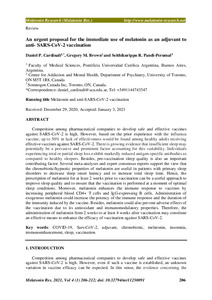Por favor, use este identificador para citar o enlazar este ítem:
https://repositorio.uca.edu.ar/handle/123456789/13669| Título: | An urgent proposal for the immediate use of melatonin as an adjuvant to anti- SARS-CoV-2 vaccination | Autor: | Cardinali, Daniel Pedro Brown, Gregory M. Pandi Perumal, Seithikurippu R. |
Palabras clave: | COVID-19; SARS-CoV-2; MELATONINA; INSOMNIO; SUEÑO; VACUNACION | Fecha de publicación: | 2021 | Editorial: | ST-Bio-Life LLC | Cita: | Cardinali, D. P., Brown, G. M., Pandi Perumal, S. R. An urgent proposal for the immediate use of melatonin as an adjuvant to anti- SARS-CoV-2 vaccination [en línea]. Melatonin Research. 2021, 4 (1). doi: 10.32794/mr11250091. doi: 10.32794/mr11250091. Disponible en: https://repositorio.uca.edu.ar/handle/123456789/13669 | Resumen: | Abstract: Competition among pharmaceutical companies to develop safe and effective vaccines against SARS-CoV-2 is high. However, based on the prior experience with the influenza vaccine, up to 50% in lack of effectiveness would be found among healthy adults receiving effective vaccines against SARS-CoV-2. There is growing evidence that insufficient sleep may potentially be a pervasive and prominent factor accounting for this variability. Individuals experiencing total or partial sleep loss exhibit markedly reduced antigen-specific antibodies as compared to healthy sleepers. Besides, pre-vaccination sleep quality is also an important contributing factor. Several meta-analyses and expert consensus reports support the view that the chronobiotic/hypnotic properties of melatonin are useful in patients with primary sleep disorders to decrease sleep onset latency and to increase total sleep time. Hence, the prescription of melatonin for at least 2 weeks prior to vaccination can be a useful approach to improve sleep quality and to ensure that the vaccination is performed at a moment of optimal sleep conditions. Moreover, melatonin enhances the immune response to vaccines by increasing peripheral blood CD4+ T cells and IgG-expressing B cells. Administration of exogenous melatonin could increase the potency of the immune response and the duration of the immunity induced by the vaccine. Besides, melatonin could also prevent adverse effects of the vaccination due to its antioxidant and immunomodulatory properties. Therefore, the administration of melatonin from 2 weeks to at least 4 weeks after vaccination may constitute an effective means to enhance the efficacy of vaccination against SARS-CoV-2. | URI: | https://repositorio.uca.edu.ar/handle/123456789/13669 | ISSN: | 2641-0281 (online) | Disciplina: | MEDICINA | DOI: | 10.32794/mr11250091 | Derechos: | Acceso abierto | Fuente: | Melatonin Research Vol. 4, No.1, 2021 |
| Aparece en las colecciones: | Artículos |
Ficheros en este ítem:
| Fichero | Descripción | Tamaño | Formato | |
|---|---|---|---|---|
| urgent-proposal-inmediate.pdf | 152,13 kB | Adobe PDF |  Visualizar/Abrir |
Visualizaciones de página(s)
64
comprobado en 27-abr-2024
Descarga(s)
54
comprobado en 27-abr-2024
Google ScholarTM
Ver en Google Scholar
Altmetric
Altmetric
Este ítem está sujeto a una Licencia Creative Commons

